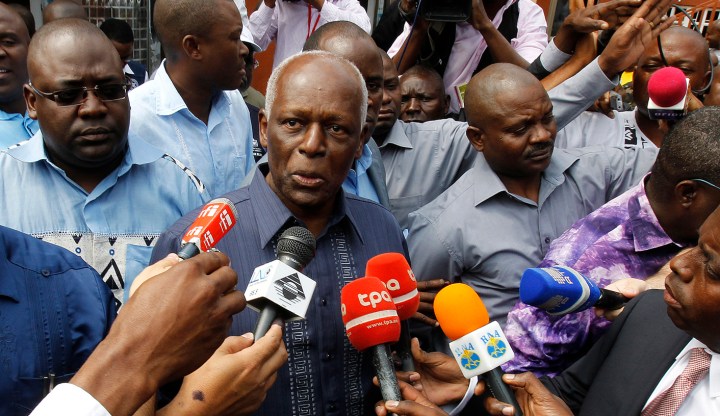Africa
Angola: More of the same from Dos Santos

José Eduardo dos Santos strolled to a landslide electoral victory Friday, only his second in more than three decades of rule in Angola. This came as a surprise to precisely no one, although South Africa will be relieved that there were no hiccups that might disrupt business as usual for our most valuable ally. By SIMON ALLISON.
In Angola’s elections the numbers tell most of the story. Like in South Africa, where the ANC competes against itself for the most part, so the ruling People’s Movement for the Liberation of Angola (MPLA) runs largely unopposed. There is some opposition, primarily the MPLA’s vanquished civil war foes Unita, but they seem hardly significant when the MPLA is getting more than 70% of the vote.
Of course, Unita cries foul; even before the election it warned that the government was fixing the ballot, citing the strange secrecy surrounding the electoral roll and the military presence at polling station as indicators that something dodgy was going on. If so, it is unlikely we will have any confirmation of irregular practices; the European Union declined to monitor the vote, citing funding issues, leaving only SADC observers to pronounce on the propriety or lack thereof of this election. Unfortunately, SADC is hardly an impartial observer. Angola is a member state and pays more than its fair share of SADC’s bills.
Despite this, it is unlikely that the MPLA would have had to fiddle the books unduly, even if it did so. The party enjoys a reservoir of goodwill for leading Angola out of civil war and for managing the country’s vast oil wealth.
Dos Santos, then, has at least another term in office. Under Angola’s new constitution, he might be eligible for another, even though it limits presidents to just two terms. Despite his lengthy tenure, an argument could be made that the constitution cannot be applied retrospectively, and this would be dos Santos’ first term in office under the relatively new constitution. A similar argument was made successfully by Senegalese President Abdoulaye Wade, allowing him to run in February’s presidential elections (which he ultimately lost).
Don’t anticipate the same fate for dos Santos. Again like South Africa, it is within the party that real leadership decisions are made, and there have been a number of rumours suggesting that Dos Santos does not intend to serve out his full term this time round, choosing instead to cede power to a handpicked successor. The current favourite to succeed him is Manuel Vicente, the man who took Sonangol, the state-run oil company, from a minor concern into an energy behemoth with a $34-billion annual turnover. That’s two-thirds of the entire public budget. These are, it must be stressed, just rumours; little reliable information emerges from the opaque bureaucracy that is the MPLA.
Oil has been the fuel behind the remarkable economic development in Angola – development for which dos Santos and the MPLA claim all the credit. The figures are astounding. Between 2002 and 2008, the economy grew by more than 15% annually. GDP per capita in 2010 was $4,328 according to the IMF, one of the highest in Africa. The capital Luanda is regularly rated as one of the most expensive in the world – a two-bedroom apartment can easily set you back R40,000 a month.
As money and investment have flooded into Angola, the country has seen its influence grow – particularly on the regional stage. For South Africa, Angola is a key ally. There are historical ties between the South African leadership and their Angolan counterparts, rooted in the brutal Angolan civil war in which the Apartheid state intervened. More importantly, Angola has the kind of disposable (oil-generated) income of which South Africa can only dream (and has been known to take advantage). The recent successful diplomatic effort to get Nkosazana Dlamini-Zuma elected to as African Union Commission chair was reportedly bankrolled almost entirely by Angola, and South Africa will welcome the election results which ensure political stability in their most valuable partner.
There is a dark side to Angola’s precipitous growth and new-found wealth. While those in proximity to power enjoy lives of luxury that grow more luxurious by the day, so the rest of the country – most of it – has seen little benefit from the oil boom, despite what the MPLA may say (during campaigning, the party claimed to have overseen the development of 6,500 kilometres of roads, 2,700 kilometres of railways, 148 railway stations, 10 renovated airports, and 400 bridges).
“Yet most of its people are still very poor,” wrote the Economist. “Two-fifths are undernourished. One in three adults is illiterate. Infant and maternal mortality rates are among the highest in the world, life-expectancy among the lowest. Corruption is rampant. Angola’s human-rights record is poor, the police brutal, the courts and the press both still hobbled. In an array of league tables, Angola comes near the bottom.”
If the MPLA wishes to maintain its stranglehold on power, this is what it must urgently address. This year has already seen minor but unprecedented protests against dos Santos. These will only increase in anger and size if the issues of development and marginalization are not dealt with. Fortunately, Angola has the resources to make serious progress in poverty, healthcare and education if the government is prepared to take these issues on. It is in everyone’s best interests for it to do so. DM
Read more:
- “Angola’s Dos Santos secures election win,” in Reuters Africa
- “Angola’s election: by hook or by crook.” in the Economist
- “Rich-poor divide scars Angola,” in Reuters Africa

















 Become an Insider
Become an Insider